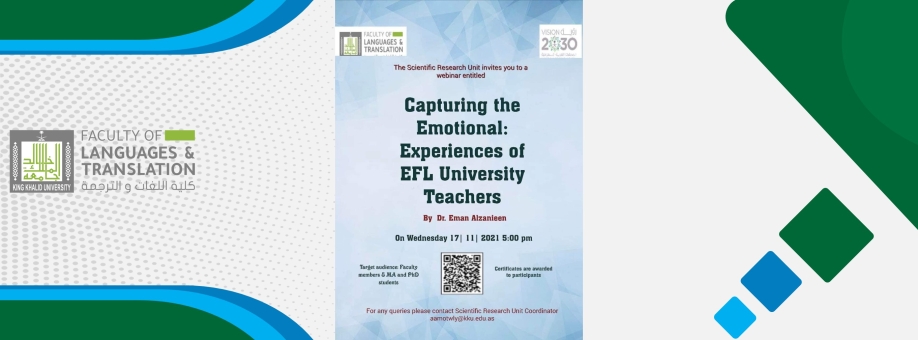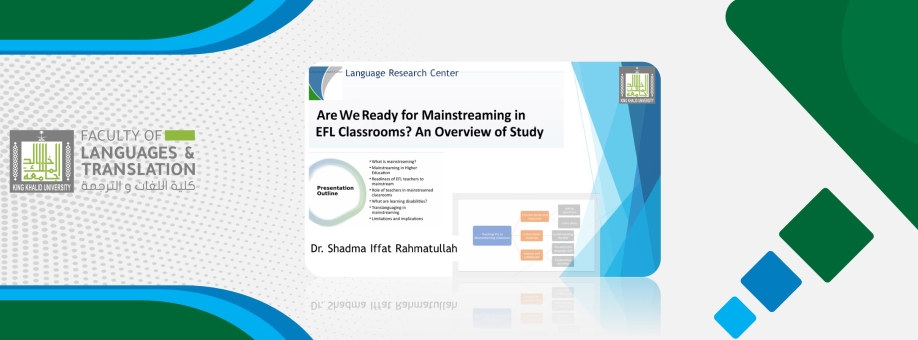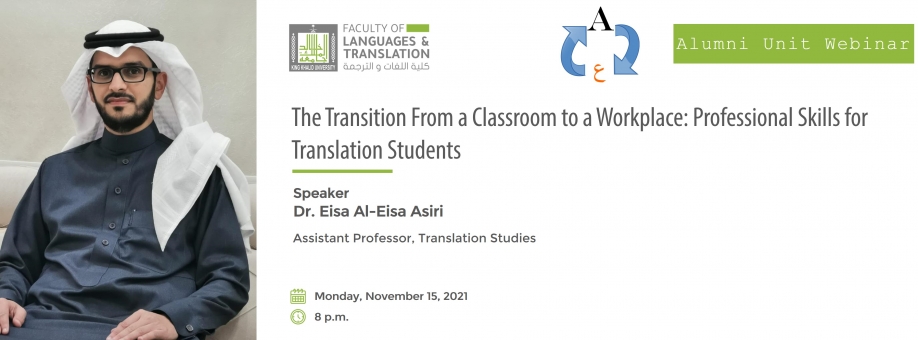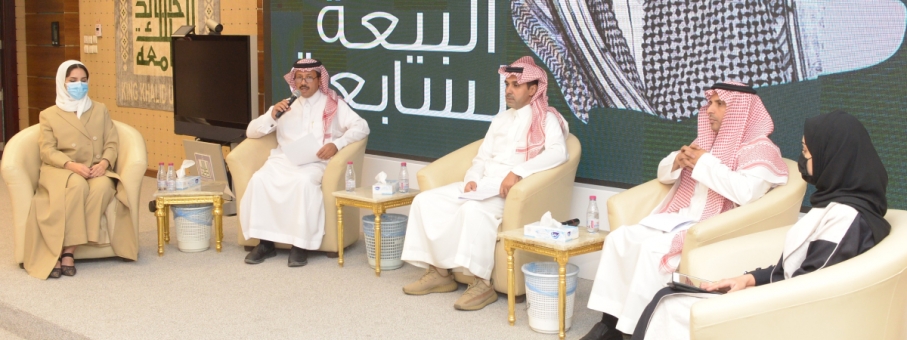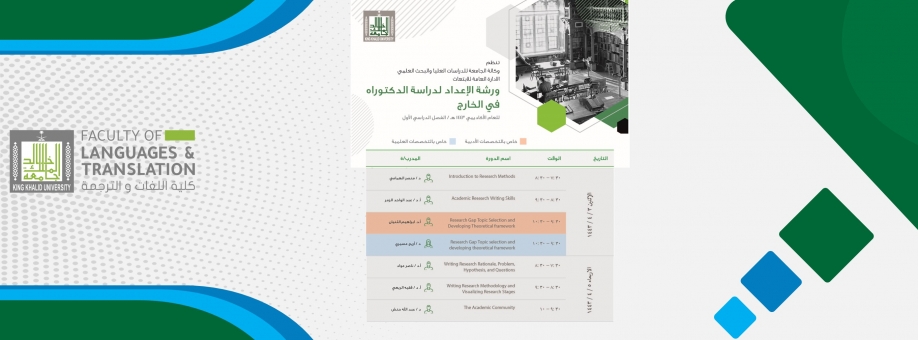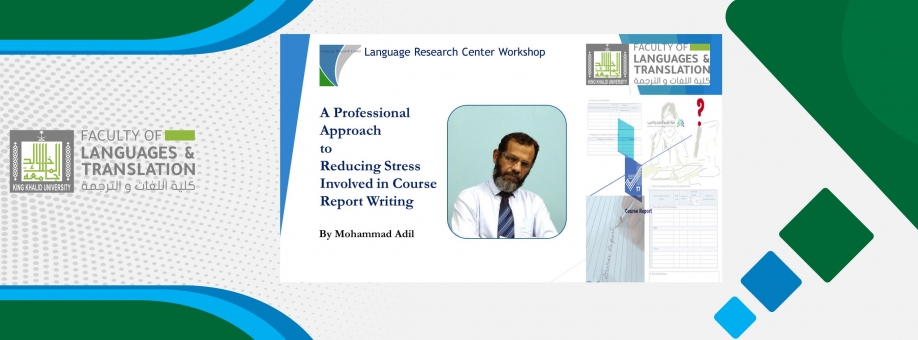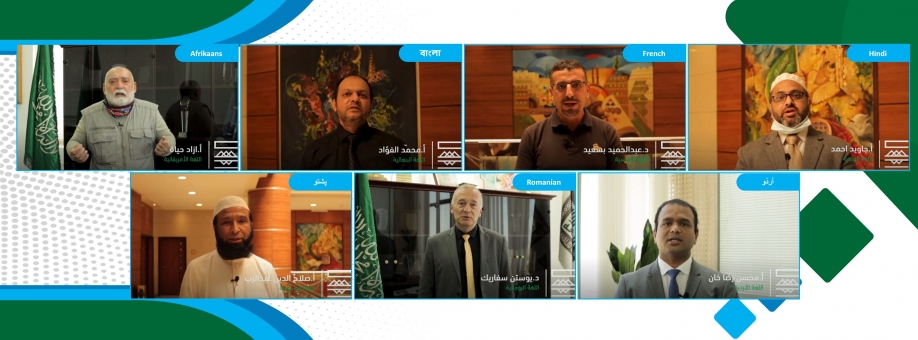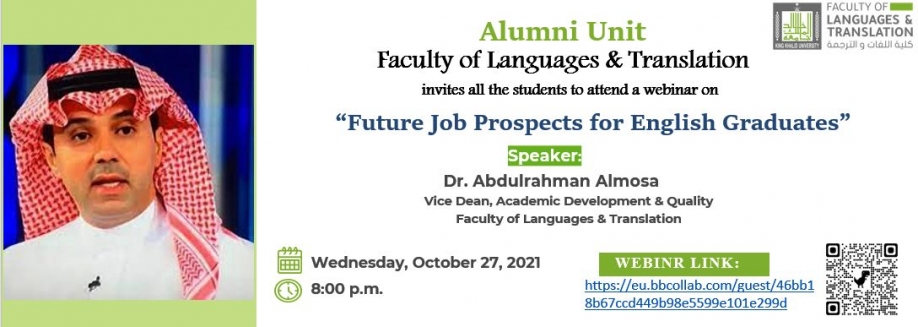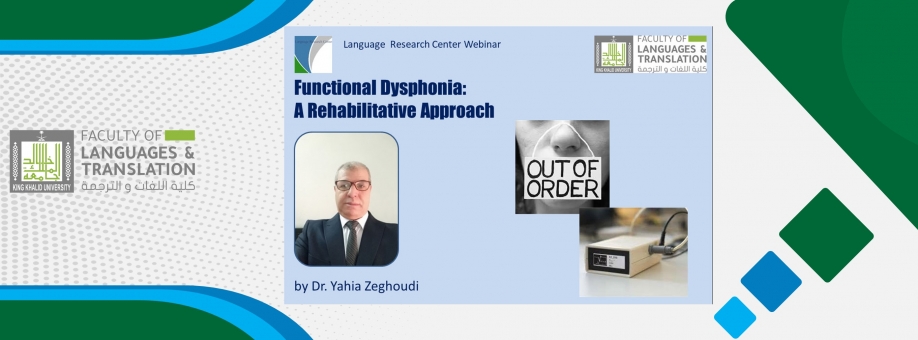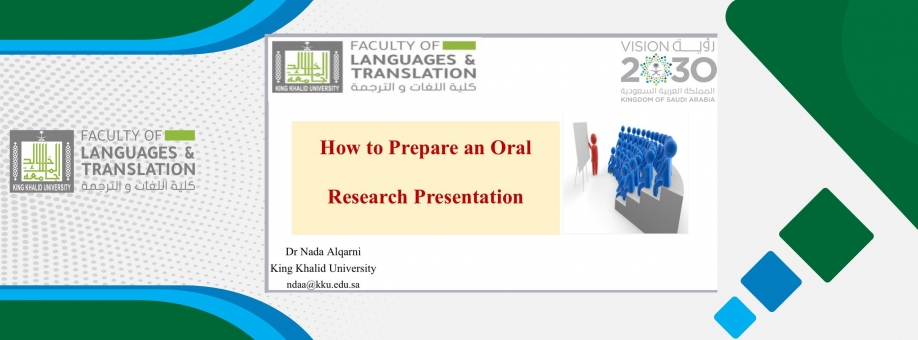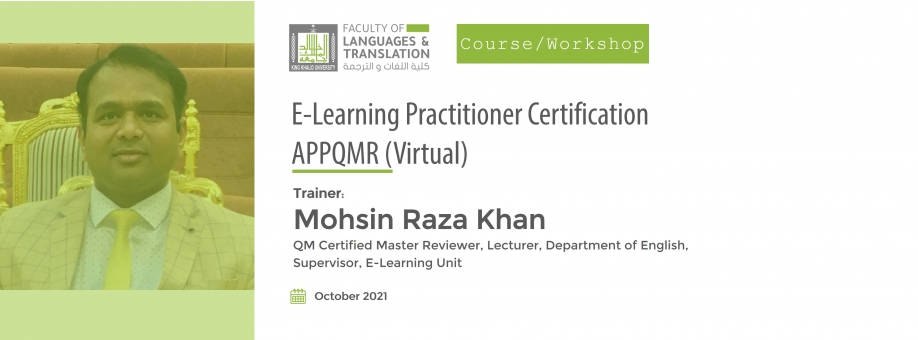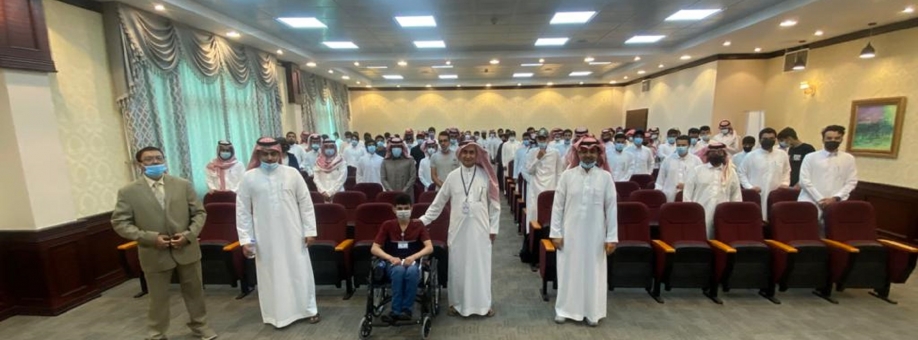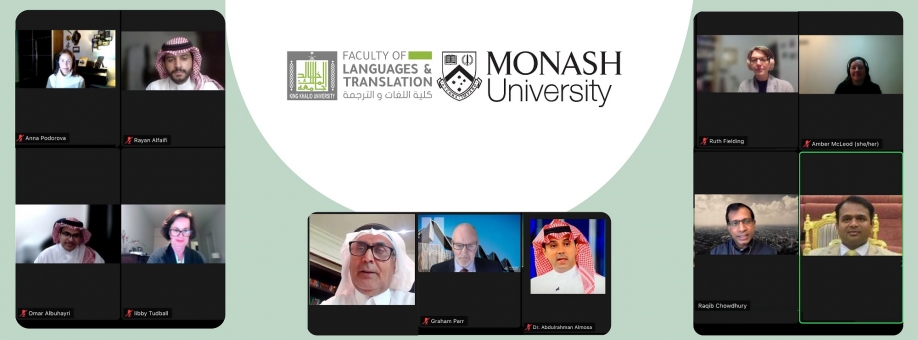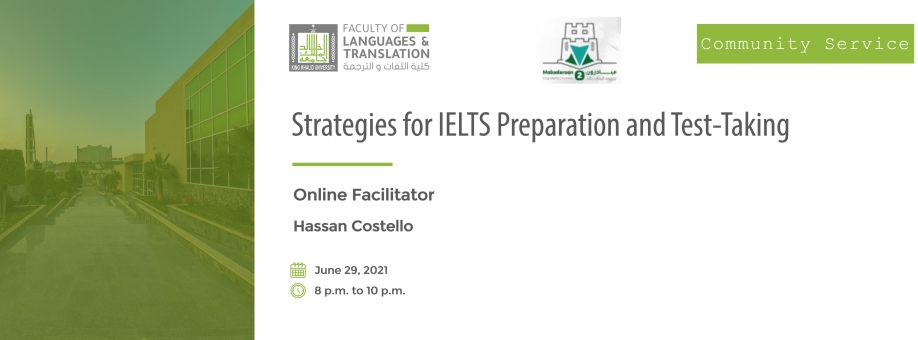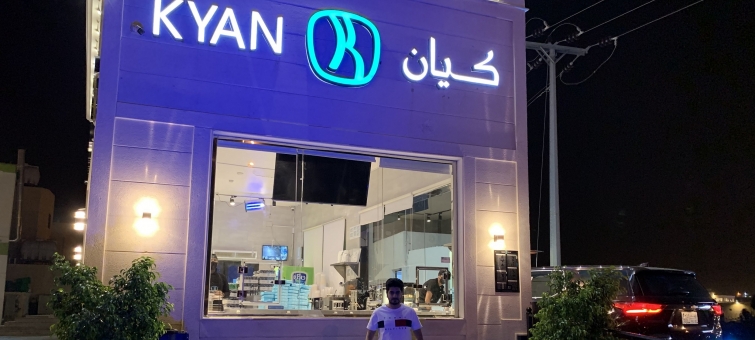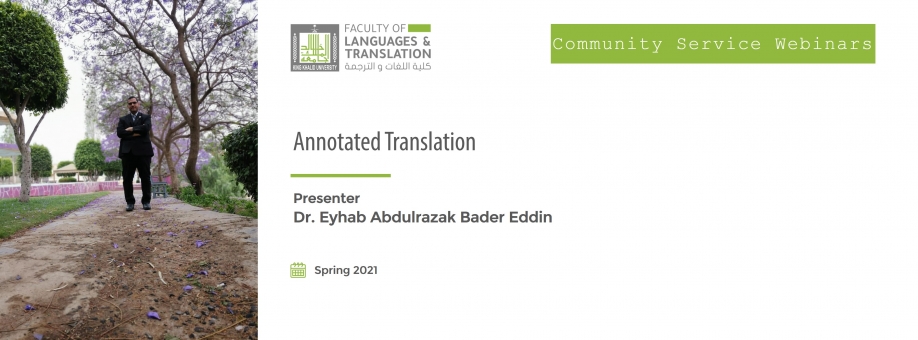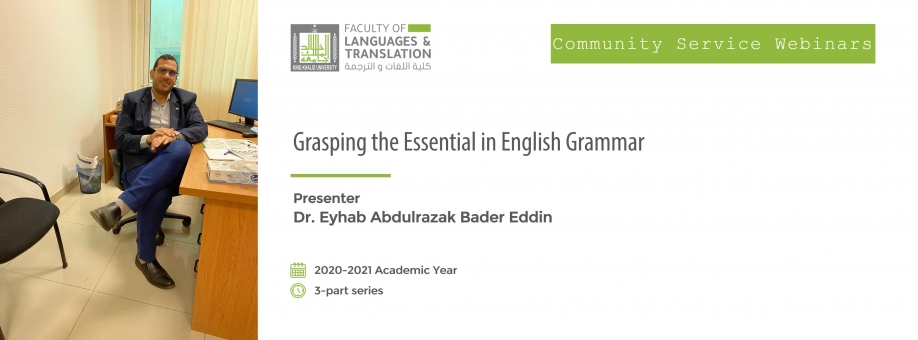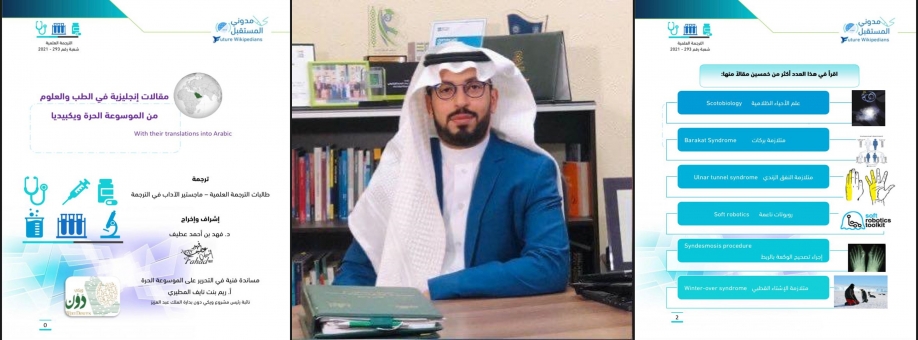News
On 17 November 2021 (Wednesday), the Scientific Research Committee organized a webinar titled Capturing the Emotional Experiences of English as Foreign Language University Teachers: A Critical Perspective presented by Dr. Eman Alzaanin, Assistant Professor in Applied Linguistics, Faculty of Languages & Translation, King Khalid University, Abha. The presenter started her talk by informing the audience that this research study (which was a very refreshing one for the audience) was her most recent one, and hardly any scholarly articles can be found on her research topic.
In the presentation, the speaker oriented the audience with her research motivation. Some thought-provoking observations were made where she said that teachers usually tend to hide their emotions which affects the teachers' approach in the classroom and their relationship with the students. Some quotes were displayed, which showed that the emotions of the L2 teachers had not been discussed so widely by most researchers and theorists. The theoretical framework, the context of the study, participants, data collection, data analysis, key findings, and the implications of the study-everything was highlighted in detail. The key findings of the research study showed that ''Teaching is an emotional practice,'' and some issues with the students could hamper teachers' passion for teaching. The positive emotions of the EFL teachers, such as happiness and pride, emerged in the study several times. On the other hand, the negative emotions of the teachers such as '' anger, frustration, anxiety, sadness, and demoralization'' were also pointed out.
The presentation came to an end by drawing the attention of the program leaders and policymakers to provide teachers with continuous professional development activities that can better the emotional competence of the teachers.
In this webinar, Dr. Hana Al Hudaithy graced the occasion, and faculty members and SRC members participated in a lively discussion with the presenter.
Date: 11/20/2021
Source: Shanjida Halim, Member, SRC
Dr. Shadma Iffat Rahmatullah delivered a presentation based on her current research study, which was entitled "Are We Ready for Mainstreaming in EFL Classrooms? An Overview of Study". It was presented at the webinar organized by the Language Research Center on November 17, 2021.
Iffat defined and explained "mainstreaming" first. This term, which is commonly used in the United States, refers to the practice of educating students with special needs in regular classes during specific time periods based on their skills, said Iffat. She added that in the Kingdom, the definition has been slightly modified as "educating children with special educational needs in regular education schools and providing them with special education services". She explained the main purpose of "mainstreaming" as to include students with disabilities within the traditional classrooms while giving them the same opportunities as other students to access instructions and to acquire proper academic knowledge and skills quoting from various sources.
The researcher highlighted some previous research conducted by some Saudi Scholars, such as Almousa (2010), which showed that Saudi Arabia was the first country to implement mainstreaming in the education sector. The study by Almousa pinpointed some difficulties associated with Mainstreaming. At the same time, she restated the words of Al-Mousa (2010) while focusing on its significance as well. For example, mainstreaming, if implemented properly, can enhance the quality of education regardless of types of students. Also, in the mainstream environment, students with special needs proved to be more active in terms of interaction and participation, she added.
The researcher explained some other related terms, such as integration and inclusion, adding that integration and mainstreaming are often used interchangeably, while inclusion is used independently.
Iffat highlighted how to prepare mainstream classroom teachers of EFL learners, which includes understanding students' learning skills, training them to meet the students' needs and classroom organization, etc.
Iffat concluded by highlighting some of its implications. She added that mainstreaming needs to be properly understood as it often has a negative connotation. Teachers' lack of knowledge and expertise often influences their classroom attitudes.
The webinar was a great success.
Date: 11/17/2021
Source: Mohammad Adil Siddique
On 15 November 2021, Dr. Eisa Al-Eisa Asiri, who recently returned from Macquarie University in Australia, delivered a webinar to 107 participants organized by the Alumni Unit of the Faculty of Languages and Translation under the coordination of Mohsin Raza Khan. The webinar — titled "The transition from a classroom to a workplace: professional skills for translation students" — introduced participants to the most important professional skills in translation (henceforth TRN) and interpreting (henceforth INT). The webinar was developed to provide students and alumni with additional activities for their professional development, consistent with the intended learning outcomes and labor market developments.
Dr. Asiri began by inquiring of the student participants how to gain advanced TRN and INT knowledge. There was a wide variety of interesting responses. One student said that the best way is to study for a degree in TRN or INT. Dr. Asiri agreed but explained that one must be an avid consumer of source text and target text materials. He emphasized that one must be a good writer and have in-depth cultural knowledge.
Dr. Asiri highlighted several practical terms as a starting point, explaining that translation memory is parts of or complete sentences that have been translated before that can be consulted while translating. In addition, tapping into one's translation memory is helpful when using technological tools for translators and interpreters. He related that most professional translators work with computer-assisted translation tools, and they test as many programs as they can.
Then, Dr. Asiri admonished the students to have an entrepreneurial spirit while showing the pros and cons of working with agencies, working with direct clients, and using portals. He noted that resumes should be ready and updated regularly. He concluded that networking and attending events, conferences, and expos, whether related to the translation industry or not, can play a significant role in finding clients and continuing one's professional development.
At the end of the webinar, Dr. Asiri thanked all alumni, undergrads, and grads who participated, noting that learning doesn't stop on graduation day. Please click here to view a recording of the event.
Date: 11/16/2021
Source: Faculty of Languages and Translation
On Monday, November 8, 2021, King Khalid University celebrated the seventh anniversary of Custodian of the Two Holy Mosques, His Royal Majesty King Salman bin Abdulaziz Al Saud's ascension to the throne. As a part of the celebration, a talk was held on leadership and achievement in theater 6. His Excellency the President of King Khalid University, Prof. Fallah Al-Solamy, led the discussion, which was open to the public.
Representing the Faculty of Languages and Translation — and all programs within — were Vice Dean for Academic Development & Quality, Dr. Abdulrahman Almosa, and Dr. Mona Al-Shehri, who is now the General Supervisor of the Student Training Unit. Of note, Dr. Almosa moderated the event and began by recalling the remarkable development and unprecedented achievements we have witnessed at all economic and social levels. Dr. Al-Shehri echoed Dr. Almosa's sentiments by explaining how the exceptional women empowerment reforms have led to an inclusive approach in their participation in national development.
Also participating in the event were Dean of Graduate Studies, Dr. Ahmed Al-Faya, General Director of the Human Resources Operations Department, Muhammad bin Shaya Al-Nahari, and student Reham Al-Shawal. They all highlighted the substantial improvements made in local governance, urban policy, and youth empowerment stemming from Vision 2030.
All programs in the Faculty of Languages and Translation are committed to implementing its role in the community partnership plan of King Khalid University. Please click here to view a recording of the event.
Date: 11/15/2021
Source: Faculty of Languages and Translation
During the week of November 7, 2021, 3 faculty members participated in a series of webinars — supervised by the Vice Presidency of Graduate Studies and Academic Research and organized by the Scholarship Department — designed to prepare teaching assistants and lecturers for the intense responsibilities and schedule of a doctoral program. On a daily basis, nearly 150 participants engaged in robust and engaging conversations with a team of leading researchers and experienced faculty from King Khalid University.
Representing the Faculty of Languages and Translation were Dr. Munassir Alhamami, Dr. Abdul Wahed Q. Al Zumor, and Dr. Fakieh Alrabai. Dr. Alhamami led off Monday's session with a presentation on research methods, and he highlighted the importance of forming a coherent picture of the research techniques used. Following closely after, Dr. Al Zumor complemented Dr. Alhamami's session by introducing participants to the specific rules, flow, and structure of academic research writing. Concluding the Faculty of Languages and Translation's participation on Wednesday was Dr. Alrabai. He led participants through research methodology and the process of visualizing the implementation of a research project.
Faculty members in all college programs are committed to regularly participating in research-based academic activities to improve our programs' and institutional performance.
Date: 11/13/2021
Source: Faculty of Languages and Translation
Mr. Mohammad Adil conducted a very effective workshop focusing on stress management which was titled A Professional Approach to Reducing Stress Involved in Course Report Writing, on November 10, 2021. The workshop was organized by the Language Research Center. The trainer, along with some basics of course report writing, particularly emphasized how to lessen stress many teachers experience before course report submission. He also emphasized that a professional approach to handling this course report task can easily reduce stress to a great extent.
The session included some brainstorming tasks for the participants. The tasks were based on the relationship between a course coordinator and instructors and how a wrong approach to designing an examination or a quiz could lead to unnecessary stress. In response to the tasks, the participants shared some thought-provoking ideas that every teacher must think of. For example, changing our mentality helps a great deal. We all should avoid downplaying the course report writing job and therefore consider it as an important one.
The trainer emphasized being proactive and working on the report ahead of time, preferably during the semester, not after the final examination. He also showed some examples of how tests, quizzes, and tasks could be aligned with the course learning outcomes in advance and how it could help design tests in a more effective way, eventually reducing stress most teachers experience at the end of every semester.
As regards Course Learning Outcomes (CLO) measurement, the trainer primarily emphasized the "Values" domain, which many instructors have experienced difficulties with. He showed a sample of a survey form that could be used in class to measure the CLOs under "Values".
Adil concluded that we, the instructors, especially the coordinators, work ahead of time by being proactive by designing and aligning. The coordinators should avoid burdening the instructors with tasks they can do easily alone. Also, the instructors should cooperate as well by being available to the coordinator.
The workshop was very engaging and a great success. Please click here to view the workshop booklet.
Date: 11/12/2021
Source: Faculty of Languages and Translation
As part of the Bachelor of Arts in English program's Community Service Partnership Plan under the supervision of Dean Abdullah Al-Melhi and in cooperation with the university Media Center, a portion of the Arabian Highland Theme in the Aseer Region Strategic Plan, supervised by the Aseer Development Authority (ASDA), was translated into seven languages. The short videos were widely distributed on YouTube and Twitter and made viewers aware that His Royal Highness Prince Mohammed bin Salman bin Abdulaziz Al Saud, Crown Prince, Deputy Prime Minister and Chairman of the Council of Economic and Development Affairs, launched the Arabian Highland development strategy in the Aseer region. In Afrikaans, Bengali, French, Hindi, Pashto, Romanian, and Urdu, the strategy's primary objective of turning the region into an all-year-round world destination through an investment of $50 billion SAR was explained. Dean Abdullah Melhi explained that this community service activity delivered in October 2021 is part of the Bachelor of Arts in English program at the Faculty of Languages and Translation's commitment to serving the community in the fields of languages and translation.
Of note, the Community Service Partnership Plan (CSPP) and Employer Advisory Board (EAB) were recently revised and approved in a Department Council meeting on November 2, 2021. The new CSPP calls for increased alignment with: the Mission Statement and the recently revised and approved EAB. It also references the Aseer Development Authority and Vision 2030 as the basis for broadening the scope of our community service partnership activities.
Particular thanks are due to our Bachelor of Arts in English program colleagues who provided accurate translations of information designed to instruct residents on the Aseer Strategic Plan. The translations were made available in the following languages:
Afrikaans, Mr. Azaad Hayat;
Bangla, Mr. Mohammad Fuad;
French, Dr. Abdelhamid Bessaid;
Hindi, Mr. Javed Ahmed;
Pashto, Mr. Salahud Din Abdul Rab;
Romanian, Dr. Justin Sfariac;
Urdu, Mr. Mohsin Khan.
Date: 11/6/2021
Source: Faculty of Languages and Translation
On 27 October 2021, Vice Dean for Academic Development & Quality, Dr. Abdulrahman Almosa, delivered a webinar to 60 participants organized by the Alumni Unit of the Faculty of Languages and Translation under the coordination of Mohsin Raza Khan. The webinar — titled "Future Job Prospects for English Graduates" — addressed the importance of durable skills. The webinar was developed to provide Bachelor of Arts in English program students and alumni with additional activities for their professional development, consistent with the intended learning outcomes and labor market developments.
"There are ten major competencies also known as durable skills that will ensure a successful career. They are leadership, character, collaboration, communication, creativity, critical thinking, metacognition, mindfulness, growth mindset, and fortitude. A great way to build those durable skills is volunteering. Volunteering will introduce you to both private industry and non-profit organizations. For example, you can learn more about project management by organizing events, which will also develop your leadership abilities and sales skills because you will recruit other volunteers to help you," began Dr. Almosa. He then pointed out that the new economy is skills-based, highlighting that we have entered the Fourth Industrial Revolution. Although having strong technical skills will always help, Dr. Almosa continued to reinforce that soft skills mean a lot. "You will need to be able to solve problems and work in teams. Actually, you will have to solve problems that do not exist yet, and you need to be comfortable continually learning new skills to solve problems," he said.
"I want to draw your attention to the Aseer Region Development Strategy. The strategy was launched by HRH Crown Prince Mohammed bin Salman bin Abdulaziz Al Saud and aims to create the conditions necessary for sustainable growth. Our region will be an all-year-round world destination, and students from the Bachelor of Arts in English program will have many job opportunities," said Dr. Almosa.
Of noteworthy mention, Dr. Almosa is well-positioned to guide our students on how their skills match the region's workforce needs, as he was the recipient of an award in October 2021 from His Royal Highness Prince Turki bin Talal bin Abdulaziz, Governor of Aseer, for his outstanding contribution to the region's strategic planning.
The Bachelor of Arts in English program at the Faculty of Languages and Translation is committed to communicating with its alumni and involving them in events and activities. Please click here to view a recording of the event.
Date: 10/27/2021
Source: Faculty of Languages and Translation
Dr. Yahia Zeghoudi’s presentation was based on a particular speaking disorder which is titled Functional Dysphonia: A Rehabilitative Approach. It was presented at a webinar organized by the Language Research Center on October 20, 2021.
Dr. Zeghoudi began the session by mentioning some common symptoms of this speaking disorder, such as hoarseness, huskiness, roughness, breathiness, restricted pitch range, etc. He also highlighted some mental, physical as well external causes such as risk involved in certain jobs, stress and anxiety, throat infections, irritants, and so on.
Dr. Zeghoudi mentioned a French citizen who was wrongly assessed by his music teacher after the World War. The teacher classified his voice range as very low. Actually, his voice was seriously injured, and he eventually became voiceless. He spent 20 years suffering from dysphonia, moving from doctor to doctor and from speech therapist to speech therapist beginning in 1956 and ending in 1976, Dr. Zeghoudi added.
In regards to therapy, Dr. Zeghoudi mentioned Guérin’s approach that is based on voice rehabilitation. Guérin started a smooth rehabilitative program. He suggested — in general — implementing about 300 vocal exercises but selected a limited number of about 15 to 20 depending on the case of the patient. Some of the basic exercises were yawning, voicing, larynx toning, and deep breathing.
The webinar was very interactive and a great success.
Date: 10/23/2021
Source: Mohammad Adil Siddique
On October 12, 2021, the Scientific Research Unit - Women’s section- organized a webinar titled How to Prepare an Oral Research Presentation by Dr. Nada Alqarni.
Dr. Alqarni started her presentation by guiding her audience to think about their target. “Think about what you want to achieve and think about how you are going to involve your audience in the presentation”, said Dr. Alqarni. She then illustrated the significance of brainstorming the main ideas, organizing the topics of discussion, getting ready for the presentation and rehearsal.
Dr. Alqarni indicated that it is important to capture the listener’s attention in the beginning. Then the presenter should state the purpose of the topic of discussion and present an outline of his/her work. Dr. Alqarni highlighted the importance of presenting the main points one by one in a logical order and making it clear when moving to another point. She indicated that using clear examples to illustrate the key findings is helpful to keep the audience involved in the discussion. In addition, she referred to the use of visual aids to make the presentation more interesting.
The webinar focused on five main points. These are: preparing an oral presentation, organizing the content, typical presentation format for research projects, delivering a presentation, and a summary of all the main ideas of discussion. In the end, Dr. Alqarni presented a video where an oral research presentation is delivered, and she explained its points of strengths and weaknesses. The presentation was followed by a discussion on presenting research projects that were nicely and neatly wrapped.
The webinar, which was mainly delivered to MA and Ph.D. students and attended by staff members from different faculties at the university, was really informative.
Date: 10/18/2021
Source: Dr. Amal Metwally - Head of Scientific Research Committee
In October 2021, E-Learning Supervisor, Mohsin Raza Khan, delivered an e-learning practitioner certification course open to all faculty members. The importance of instructional design training and an enhanced learning environment for students is well known to all colleges of the university. "The two-week practitioner course is part of a university-wide strategy to provide the knowledge and skills needed to capitalize on one of the fastest-growing areas of education while creating captivating learning experiences for students. Around 60 faculty members participated, and we really focused on how to leverage some of the tools that can be used to increase social interaction, which is often missing in an online or remote environment," said Khan.
The primary objectives of the course were to improve student learning, engagement, interaction, and quality learning. These objectives were solidified by the core foundation of the program that participants would be able to:
Create content items to present a variety of learning activities to enhance student learning.
Deliver authentic assessments to evaluate student knowledge in a variety of meaningful ways.
Use Blackboard communication tools to promote interactions between the student and instructor, the student and course content, and the student and peers.
Effectively utilize Blackboard Collaborate™ tools to increase student engagement by providing a means to share and create knowledge.
Of noteworthy mention, in March 2021 and concurrently with the e-learning practitioner course in October 2021, Mr. Khan also delivered the Applying the QM Rubric workshop (APPQMR), which is offered by the Deanship of E-Learning in partnership with QM. "Dozens of workshop participants successfully completed 10 modules. They learned more about the QM rubric and annotations. We really focused on the importance of having measurable course and module objectives." Director of Instructional Design, Abdullah Zubain, said: "The APPQMR course is also a prerequisite for anyone looking to obtain the QM peer reviewer certification. I thank Mohsin, our women's campus QM coordinator, Safa Al-Shehri, and our training manager, Ali Alaosi."
The Bachelor of Arts in English program is expanding its educational resources to serve more members of the community and is committed to continuous improvement in all academic programs. E-learning is a vital component of both objectives and a vital tool for educational development at the university and other educational institutions throughout the Kingdom.
Date: 10/14/2021
Source: Faculty of Languages and Translation
Ms. Amatul Hafeez Alvi presented her research paper she had previously presented at the 1st AEJ UKI SLA Research International Conference that aimed at bringing together English language professionals from around the world to share, learn, and further the English language. Her research was titled "From Pedagogy to Andragogy in Post COVID-19 ESP Courses: A Customized Blended Learning Model for English in Medicine at a Saudi University", and was presented at a webinar organized by the Language Research Center on October 11, 2021.
Alvi began the session by talking about a customized blended learning model for teaching English in Medicine at King Khalid University. In her research, she mentioned, she had tried to address the challenges which COVID-19 posed when teaching a subject like this. She shared her experience as she had done at the conference.
Alvi highlighted how COVID-19 affects health, the public, the entire society and most importantly the education system worldwide. Many countries around the world dramatically changed their policy with regard to education to ensure the proper safety of the people involved, she added.
Alvi emphasized that the education sector was so immensely disturbed that the attendance to universities, colleges, and schools was suspended almost globally. According to statistical data in 2021 from UNESCO, more than 94% of students around the globe were affected by this pandemic. She mentioned Saudi Arabia as one of the success stories in the world when it comes to coping with the impact of COVID-19 in the education sector.
Alvi pinpointed the fact that some courses were affected severely due to this pandemic. English for specific purposes (ESP), which has an "oriented focus", is one of those affected as face-to-face mode would be more effective. Such ESP courses, she added, are completely different from EFL and ESL courses in that they primarily focus on language in context. In ESP, the learners' knowledge of English reflects directly on their profession. Her research focused on English in Medicine. In the case of ESP, she added, they actually concentrated on the transfer from Pedagogy to Andragogy, the latter of which is more learner-centered.
Alvi concluded that we need to explore more methodologies and approaches to make ESP more effective.
The webinar was very interactive and a great success with the active participation of both male and female faculty members.
Date: 10/14/2021
Source: Mohammad Adil Siddique
أقامت وحدة التوجيه والارشاد بكلية اللغات والترجمة يومنا هذا الأحد بتاريخ 5 /2 /1443، حفل استقبال الطلاب المستجدين.
حضر اللقاء سعادة عميد الكلية ووكلائه الكرام ورئيس قسم اللغة الإنجليزية والمشرف على وحدة التوجيه والإرشاد ومسؤول وحدة التعلم الالكتروني وعددا من أعضاء هيئة التدريس، وكان لقاءا إيجابيا قدم من خلاله سعادة العميد والوكلاء كلمات ترحيبية و توجيهية وحثوهم على الجد والاجتهاد و المشاركة في الأنشطة الطلابية المتنوعة، كما ألقى رئيس وحدة التوجيه والإرشاد بالكلية كلمة توجيهية عرّف من خلالها بأنشطة الوحدة وأهدافها وخدماتها وأهمية وجود مثل هذه الوحدات في الكليات، تلا ذلك تقديم مقدمة تعريفية عن استخدام منصة البلاك بورد من مسؤول وحدة التعلم الالكتروني.
وختاما، تم الرد على عدد من أسئلة واستفسارات الطلاب، ثم التقطت صور تذكارية بهذه المناسبة.
Date: 9/12/2021
Source: Faculty of Languages and Translation
Under the supervision of Dean Abdullah Al-Melhi, the 2021 Online Summer Language Program (OSLP) titled "English Across Cultures and Intercultural Awareness" ended on 19 August 2021. OSLP is a four-week, intensive program in language study designed specifically for the curriculum in applied linguistics taught with a focus on intercultural awareness and different models of teaching and learning English. OSLP, much like our summer language program at Swansea University in 2019, was designed as an in-person, intensive language program, but due to the COVID-19 pandemic, OSLP ran synchronously online for the first time.
The OSLP team, led by Vice Dean for Academic Development & Quality, Dr. Abdulrahman Almosa, Chairman, Dr. Munassir Alhamami, and E-Learning Supervisor, Mohsin Raza Khan, sprung into action to co-develop — along with the team at Monash University — a fully online four-week summer language program for 63 of the best and brightest male and female students students in the Bachelor of Arts in English program.
Dr. Almosa noted, "This was the first time we held an online summer language program in cooperation with a leading international university. There were several technological and pedagogical challenges in developing an effective program that incorporates a social and cultural immersion experience that our students would get in person. Most of the modules were designed around language and culture concepts and instructional design, which are at the heart of recent developments in applied linguistics and related fields. I am pleased to report that our program was a success and among the first of its kind in the Kingdom of Saudi Arabia. I sincerely thank Dr. Nizar Farjou, Dr. Raqib Chowdhury, Dr. Ruth Fielding, Susan Davis, Dr. Anna Podorova, Dr. Libby Tudball, Dr. Melissa Barnes, Dr. Dat Bao, Dr. Amber McLeod, and Ouahiba Zarzi at Monash University for their diligent collaboration and effort to make our joint program successful."
In his closing remarks, Dean Al-Melhi congratulated the students involved in the joint program and expressed his appreciation to all participating faculty members at Monash University and the Faculty of Languages and Translation at King Khalid University. The Bachelor of Arts in English program is committed to providing students with additional activities for their professional development, consistent with the intended learning outcomes and labor market developments.
Date: 9/3/2021
Source: Faculty of Languages and Translation
On 29 June 2021, Hassan Costello delivered a 2-hour webinar titled "Strategies for IELTS Preparation and Test-Taking". Under the supervision of the Vice Presidency of Business and Knowledge Economy, the webinar was organized by the Scholarship Administration and Faculty of Languages and Translation as part of Mobaderoon 2, a community service initiative focused on furthering the development of knowledge exchange between King Khalid University and the community. In the webinar, Costello explained to nearly 250 participants that there are plenty of decent study guides on the market, but his goal was to provide practical strategies that can be used to exploit weaknesses in the test itself and avoid the most common errors when taking the IELTS. "Each tip was carefully selected for its effectiveness. Strive to become an expert in learning what works well and what can be done in order to improve," he said.
The Bachelor of Arts in English program at the Faculty of Languages and Translation is committed to participating in community partnership activities as part of its role in the community partnership plan at King Khalid University.
Date: 7/9/2021
Source Faculty of Languages and Translation
Mubarak Saeed Al-Qahtani, class of 2021 graduate, has wanted to own a business since his freshman year in the Bachelor of Arts in English program, and that dream has become a reality. Al-Qahtani has brought an Al-Qassim touch to the Asir region with several drive-through coffee shops.
"College and coffee are a perfect match, and Kyan Cafe is no exception," said Al-Qahtani. While sitting in the King Khalid University parking lot before an exam, Al-Qahtani began to notice several rearview mirror air fresheners with the Kyan Cafe logo on it written English and the rest is history. He immediately began to research the brand and asked a few of his instructors in the Bachelor of Arts in English program what they thought about him becoming an entrepreneur. After receiving words of encouragement, he immediately formulated his idea, which revolved around quality, speed and convenience. Al-Qahtani credited much of his success in the operational side of the business to being able to use the language skills he picked up in the Bachelor of Arts in English program, which improved his ability to understand when to speak or write, who to deliver the message to, and what to say and how to say it. "I can honestly say that graduating with a degree in English has helped to use Foodics, which is the point of sales system we use. My dream is to launch new innovative ideas in cooperation with international companies and become a franchisor. I encourage all of the students from our program to contact some of the startup accelerators we have in Saudi Arabia to pitch their business ideas and obtain funding. There are some in Riyadh, Jeddah, and we have one in Asir," he said
The Bachelor of Arts in English program is dedicating to fulfilling its role in developing entrepreneurial leaders with the language competence necessary to take advantage of the new economic realities of the Kingdom of Saudi Arabia by inculcating creativity and innovation in the learning process.
Date: 6/28/2021
Source: Faculty of Languages and Translation
Dr. Eyhab Abdulrazak Bader Eddin, Assistant Professor of Translation, has written a chapter for a book entitled "Research Into Translation and Training in Arab Academic Institutions". The book will be published by Routledge on July 30, 2021. Dr. Bader Eddin's chapter is entitled "Insights into Translators Training: Issues and Methods of Assessment". As explained in the book description, the book "addresses translators' status, roles, and structures. It also provides Arab perspectives on translation and translation training, written by scholars representing academic institutions across the Arab world. Themes in this collection include training terminologists on managing, promoting and marketing terms; corpora and translation teaching in the Arab world; use of translation technologies; translators training and translators' methodologies and assessment of translators' competence; research on translator training; and the status quo of undergraduate translation programs in a sample of five Arab universities. A valuable resource for students, professionals and scholars of Arabic translation and interpreting."
Date: 6/8/2021
Source: Faculty of Languages and Translation
Dr. Eyhab Bader Eddin has undertaken a fresh initiative for bringing "Annotated Translation" to light. Annotated Translation is a fascinating yet complex subject that has increasingly come to prominence and gained currency for being adopted as a major assessment method for Translation students in both undergraduate and graduate programs. Although a firm dividing line could be drawn between 'annotated translation' and 'translation commentary', they both have been used interchangeably in his session open to the public during the Spring 2021 semester. Dr. Bader Eddin delivered a 2-hour-long session — titled "Annotated Translation: Showing students the ropes — on the fundamentals of the subject", drawing attendees' attention to the seminal book, which was the first of its kind, fully devoted in a book-size work to this subject. Viz. Sewell's 2002 (Translation Commentary: The Art revisited). The session tackled such points as definition, How should an annotated translation look like? What should it include and exclude, desirable and undesirable features, marking criteria for translation commentary, steps to initiate a translation annotation project, and some illustrative practical examples. Some tangible examples have been offered to link theory to practice, as a rarely distinguished feature in translation. The session was followed by some assignments to ensure the attendees had grasped the content of the session.
To view all webinars, please click here.
Date: 5/6/2021
Source: Faculty of Languages and Translation
In a continuous series of sessions aimed at advancing and deepening understanding of graduate students, Dr. Eyhab Bader Eddin started to offer an advanced free intensive course on the Parts of Speech. Students at the graduate or doctoral level who are in the process of writing their thesis, dissertations, or research papers face unique challenges. These papers indicate whether or not they understood the concepts clearly. For this reason, Dr. Bader Eddin held a 3-part webinar series on the 8 parts of speech open to the public during the 2020-2021 academic year. The webinar, tailored to graduate students, attracted hundreds of attendees from different parts of the world. High on the target list came graduate students and English teachers for the purpose of addressing any problems related to parts of speech and to fill any gap in their linguistic knowledge so as to clamber up the rung of their mental ladder aplomb.
"While it may seem that having a detailed understanding of the parts of speech is not needed, it is imperative that graduates of the Faculty of Languages and Translation present their papers in the right manner with proper sentence structure," said Dr. Bader Eddin. He then explained that Dean, Dr. Abdullah Al-Melhi, and Vice Dean of Postgraduate Studies, Dr. Munassir Alhamami, were highly supportive of his 3-part webinar series, which was launched to engage the community, alumni, and currently enrolled students at the undergraduate and graduate levels.
The topics discussed included, but were not limited to the following:
Language components
Detailed Overview of the parts of speech
Grammatical hierarchy
Sentence types according to A) structure and B) communicative function
Syntactic theory
Language universals
Semantic classes
Typology of parts of speech systems
Language components
Overview of parts of speech
Grammatical hierarchy
Sentence types according to A) structure and B) communicative function
Nouns as a part of speech
Noun types and characteristics
Noun plural formation
Noun plurals
Noun gender
Noun Case
Noun genitive and -of phrase
Meanings of genitive and –of phrase
These sessions were followed by assignments handed out to ensure the attendees' thorough understanding of the topics covered. Questions were always welcomed to clear away any fog of misunderstanding during the course of the sessions. It is worth mentioning that we have come to know that new sessions are to be held soon in a bid to complete the series.
To view all webinars, please click here.
Date: 5/6/2021
Source: Faculty of Languages and Translation
Supervised by Dr. Fahad Otaif, Assistant Professor of Critical Discourse Analysis and Translation, a team of postgraduate female students from the Faculty of Languages and Translation (FLT) participated in the "WikiDowen" project during the Spring 2021 semester. The WikiDowen Project, under the administration of the King Abdulaziz Foundation for Research and Archives (Darah), aims to enrich and increase the Arabic content on Wikipedia; although Arabic is the fourth most popular language in the world, the Arabic content on Wikipedia still ranks 25th in terms of volume.
Dr. Otaif praised the postgraduate students who worked hard, saying that: "the students were really motivated to take part in this initiative, they worked hard to translate more scientific content. The initiative resulted in 50 articles translated from English into Arabic. The translated topics ranged from medical topics, to psychology, Artificial Intelligence as well as engineering. The translated articles were compiled in a digital booklet to document the scientific outcomes of the initiative".
Dr. Otaif added, "the WikiDowen's Project manager, Dr. Zuhair Al-Shehri, and his deputy Ms. Reem Al-Mutairi also played a vital role in helping the new Wikipedians (translators) to post and edit their translations on the Arabic Wikipedia; this cooperation lasted for two months and was really fruitful for both parties."
Vice Dean for Postgraduate Studies, Dr. Munassir Alhamami, added, "we are excited to be a part of this national volunteer initiative for the second year in a row; it provides our FLT students the opportunity to participate in a field experience activity that is aligned with the learning outcomes we target in our language and translation programs."
Dr. Otaif added, "such initiatives and projects will grant our students valuable experience and help them in mastering the translation profession through which they will improve their professional background and job readiness; I do thank our Dean Dr. Abdullah Al-Melhi and the vice dean for postgraduate studies at the Faculty of Language and Translation for their endless support in this initiative and will continue to encourage similar initiatives at the FLT in the near future en shaa' Allah."
Date: 5/4/2021
Source: Faculty of Languages and Translation

